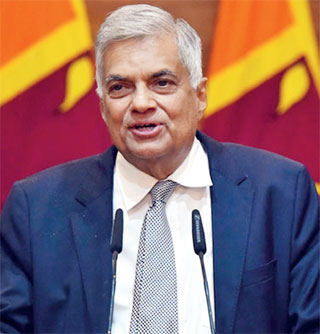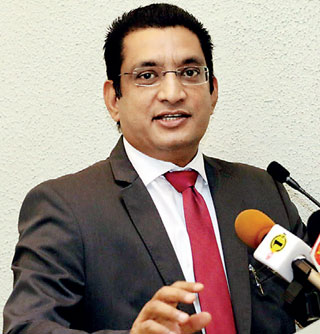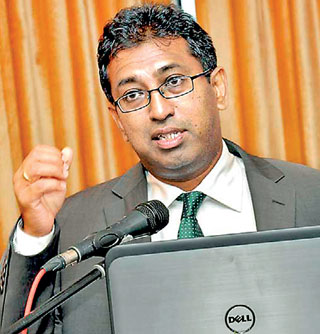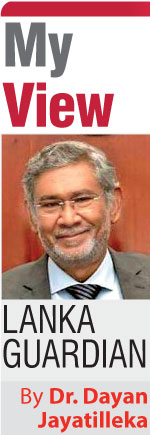Thursday Feb 19, 2026
Thursday Feb 19, 2026
Thursday, 9 March 2023 01:22 - - {{hitsCtrl.values.hits}}

President Ranil Wickremesinghe

Foreign Minister Ali Sabry

Dr. Harsha de Silva
|
“Where a class abdicates its moral right to leadership, it is already doomed and must surely die”
– Mervyn de Silva, ‘1956’, Ceylon Observer Magazine Edition, May 16th & 23rd, 1967
 The likely unlocking of IMF funds must be welcomed only with the utmost caution rather than exultant celebration, not only because of the continuing and coming cutbacks and plummeting living standards, but because of the logic—or rather, illogic-- of the path itself.
The likely unlocking of IMF funds must be welcomed only with the utmost caution rather than exultant celebration, not only because of the continuing and coming cutbacks and plummeting living standards, but because of the logic—or rather, illogic-- of the path itself.
The Government will use the IMF certification to borrow money from international institutions i.e., get deeper into debt, to pay off our creditors. We are going to be modestly funded so we can get into more debt to repay the debt we – or more correctly the Rajapaksa and Ranil administrations (2009-2019) --already have incurred. We are about to be turned into a hamster on a wheel; imprisoned in a game we can never win.
Our citizens are going to be imprisoned or shot if they don’t comply with savage slashes to their employment, wages, pensions and their children’s meals, and instead protest against cutbacks imposed by the same Ranil Wickremesinghe who borrowed the money from the private creditors (2015-2019) whom we are now about to be bankrolled by the IMF to be able to repay through more borrowing. (The Real Cause of Sri Lanka’s Debt Trap – The Diplomat)
Unless, that is, we install a new government that transparently renegotiates the opaque IMF deal and places us on the path towards an exit from the debt cycle; a cycle which is part of a downward spiral.
Or, if no moderate social democratic party steps up to the plate, we the people, radically change the ‘construct’ and the system, installing a government that re-patterns the domestic economy in a manner which enables us to breakout of the debt prison and is eminently compatible with rising public sentiment. (Widespread public support for Aragalaya but Lankans are souring on capitalism: Poll | Daily FT)
Ranil’s rules
In a triumphalist and bellicose parliamentary address on Tuesday, 7 March 2023 announcing the imminence of a programmatic agreement with the IMF, Ranil Wickremesinghe, an unelected president who wasn’t elected even to parliament, gave a clear indication that he does not feel committed to holding the presidential election in/by November 2024 and the parliamentary election by 2025 at the least, as prescribed in the Constitution. He explicitly elasticised the electoral calendar:
The electoral can keeps getting kicked down a long and winding road. The parametric Constitutional stipulation is ignored. Holding the presidential and general election are made contingent on “accomplishing this”, meaning “stabilizing the country’s economy”. There is a further open-endedness: “after accomplishing this…” How long after, and who decides?
Who decides whether or not the economy has been stabilised? What are the criteria of stabilisation? What makes economic ‘stability’ more important than the stabilisation of people’s lives and livelihoods, children’s nutrition and mortality?
Wickremesinghe darkly threatened the people with a harsh crackdown if they took exception to his economic roadmap issuing from his agreement with the IMF:
Ranil should ask his contacts in journalism about the term “IMF riots”. These are not riots caused by a failure of a government to sign a deal with the IMF, but widespread and well-researched social phenomena which result precisely from the attempt to unilaterally impose savage IMF cutbacks.
An elected President may be able to coax a consensus through dialogue but an unelected president who threatens the people and cracks down violently can only destabilise any IMF agreement by provoking a mass upheaval.
President Wickremesinghe arrogantly asserts that “there is no alternative path to be seen at present.” Such a path cannot be “seen” at present because it is not allowed to be seen in the electoral marketplace which he has shut down. At an election the people would exercise their sovereign right to choose between competing paths which may or may not entail an agreement with the IMF, and even if it does—as I believe it should—it may not be this particular agreement.
Ranil’s strident speech on the 72nd anniversary of the Air Force is further evidence of dangerous delusion:
“…President Wickremesinghe highlighted that any changes to the Government must be made through the proper channels, such as a parliamentary election. The streets are not an option for the Parliament, and any attempt to subvert the established process would be a violation of Sri Lanka’s Constitution and the rule of law…” (President says taking to streets is not an option to topple Govt. | Daily FT)
That’s nonsense:
I. The citizenry by-passed Ranil’s prescribed path and exercised the option of forcing out a President elected by a decisive majority of a nationwide electorate. They did so because that President had unilaterally torn up the social contract.
II. Ranil is President because he was Prime Minister. He was Prime Minister not because he was elected at a parliamentary election but because the PM resigned in the face of popular protest, not a parliamentary election. Ranil’s road to incumbency proves that the parliamentary path is not the only option that history—including the current history of Sri Lanka – provides.
III. By making the holding of elections contingent on his personal perception of economic timeliness, rather than complying axiomatically with the Constitution, the independent Election Commission and the Supreme Court, Ranil has undermined his own argument. You cannot sabotage and subvert the electoral calendar and process, and then prescribe the path of parliamentary elections as the sole option for change of government.
Sabry’s subordination
Foreign Minister Sabry has just set a world record and has also given a new meaning to the term ‘foreign’ minister, as one who represents the strategic and economic interests of a foreign country or countries and their entrepreneurial elite, rather than the national interest of his own country.
The Hindustan Times quotes him as saying: “We want to integrate and probably allow Indian currency to be a tradeable currency in Sri Lanka…”. (Won’t allow anything harmful for India’s security: Sri Lankan foreign minister | Latest News India - Hindustan Times)
Minister Sabry says “we want to integrate and…”. ‘Tradeable currency’ about which I am agnostic, is downstream from the intention “to integrate”. This echoes President Wickremesinghe and High Commissioner Moragoda and is a distant echo of J.R. Jayewardene’s stated aspiration in the 1940s of a confederation with India.
I challenge anyone to name a foreign minister who expressed a wish “to integrate” not with the region/continent concerned, which would be unexceptionable, even desirable, but specifically and primarily with a very much larger neighbour. Bangladesh was pretty much created by India but no Bangladeshi foreign minister ever advocated integration with India. Vietnam doesn’t wish to integrate with China.
The foreign minister’s task is exactly the opposite, namely to ensure the national independence and sovereignty, and maximise the autonomy of the country he is the foreign minister of—not facilitate its certain domination.
In terms of history and social science, if the bourgeoisie as a class and Lankan capitalism as a system have abdicated the classic tasks of defending Sri Lanka’s independence and sovereignty, and have returned to the role of subordinate intermediaries or agents— ‘compradors’-- they have forfeited their role in history.
The most important part of the unwritten job description of a Sri Lankan foreign minister today is to balance between India, China and the US, and with particular ambidexterity between India and China, as did Lakshman Kadirgamar. By contrast, Minister Sabry blundered badly by insolently criticising China in his interview on Indian soil to a leading Indian newspaper:
“…China has given some sort of a letter to Sri Lanka, with a copy to IMF, saying they will cooperate for Sri Lanka’s Extended Fund Facility (EFF) application with the IMF, but that’s not compatible with what IMF wants. That is where the problem is.” (ibid)
“China has given some sort of a letter”? Seriously? Is that the language and tone the Sri Lankan foreign minister should use about our staunch friend China, a great power and one of the two main global powers, while on a visit to India?
By adding “that’s not compatible with what the IMF wants”, Sabry tilts in favour of the IMF explanation and against China and privileges the IMF over China. His conclusion “that is where the problem is” overlooks the more intractable problem of the private creditors, and parrots the western narrative that the main problem lies instead with China’s position.
SJB’s ‘pro-IMF’ economists
The lead economists of the SJB are rightwing liberals while the party is centrist-progressive. In a recent tweet, Dr. Harsha de Silva described himself as “pro-IMF”. He is also quoted in a mainstream Sinhala-language newspaper as saying “the President is correct: the present pensions scheme has to go”. In a new tweet he has supported the Government’s impending de-regulation of the exchange rate and moving to a ‘stable equilibrium’ as stated in the Economic Blueprint.
An official UNP tweet approvingly embeds a TV News clip of Harsha’s presser where he proclaims “we must admit that the economy has stabilized and the rupee has strengthened”. Harsha must hope he never has to debate Pubudu Jayagoda on TV.
How can an economist who defines himself as ‘pro-IMF’ secure the best deal for this country from the IMF or the creditors? The IMF is no enemy but no warm fuzzy friend either. We need someone who will negotiate hard for us, not someone who is already a fan of the guys across the table.
Harsha’s self-identification contrasts with the great tradition of Ceylonese/Sri Lankan economic policymakers. When Dr. Gamani Corea former Head of Planning in the Dudley Senanayake government (1965-1970) headed UNCTAD, he was ‘pro-Global South’ not ‘pro-IMF’ or ‘pro-World Bank’ or ‘pro-transnational corporations’.
Harsha’s ‘pro-IMF’ tattoo is electorally enormously counterproductive. The IMF endorsed the Wickremesinghe administration’s tax package which has unprecedentedly brought together leading professionals with blue-collar workers, in a combative coalition of over 100 trade unions.
Come the parliamentary elections, the voters will remember who was on which side of what measure.
I cannot think of any leader or governing party anywhere that was re-elected to a consecutive second term having fully implemented an IMF stabilisation/austerity program.
Nor can I recall a context in which the ruler was implementing an IMF program, the public was animated by an anti-incumbency mood, and the lead economist of the main Opposition party called himself ‘pro-IMF’.
Why vote for an Opposition whose main economists are in agreement with the President on painful aspects of economic policy, when they can directly vote for the President’s party (UNP) or supportive coalition (SLPP), or if they disagree, can vote for a party clearly opposed to the Ranil-IMF policy?
How can the public trust those of the economic Right who have not been critical about the massive borrowings in 2015-2019 from the private money markets (mostly in the West) which is the most cancerous component—not the indebtedness to China—of our debt bulge?
If the SJB prevails it will be solely because of Sajith Premadasa and the memories of his father’s ‘accelerated equitable growth’ achievement that still animate audiences.
A Sri Lankan social democratic macroeconomic paradigm is nothing other and nothing less than President Premadasa’s policy paradigm. The SJB’s ‘Economic Blueprint’ flies in its face. Unsurprisingly, he isn’t mentioned in it even once.
The SJB’s economic troika doesn’t know the difference between the Jayewardene FTZ model and Premadasa’s 200 garment factories program, why the latter was adopted, and why it is superior.
They don’t understand—though they should now, with Dr. Ravi Ranan-Eliya’s statistical evidence on the unpopularity of capitalism—why on his 91st birthday Ronnie de Mel told Sajith Premadasa on camera that only he can revive the open economy and to do so he should be “more socialistic”.
Those collaborators in the SJB who say that in the face of the IMF agreement and/or the JVP’s challenge, there should be convergence with Ranil and the UNP, fail to comprehend that in such an event many SJB voters who support the party because of the Premadasa brand (as in 1988) and the prospect of the revival of the populist Premadasa programs, would defect to the JVP-JJB or simply stay home.
Neither Roosevelt’s New Deal nor Premadasa’s New Vision would have been implementable without the presidency. If the executive presidency is abolished or, as Prof. Howard Nicholas points out, the Central Bank is made ostensibly independent but actually subject to the International Financial Institutions and foreign finance capital, then that factor of Sajith’s leadership will have reduced importance. This would leave the SJB’s current economic team dominating macroeconomic policy in Cabinet and through the ‘independent’ Central Bank. In short, Ranilism without Ranil. There may be a reunification of the Right, with the residue of the Ranilist UNP.
Such a dispensation will unbalance our foreign policy still further. If the executive presidency is abolished and the Premadasa factor downsized, rightwing economic policy will have a pro-West foreign policy as corollary, based on specious argumentation. ‘Where the markets are so must our foreign policy affiliation be’ is the ridiculously reductionist dictum which ignores the abstentions of Vietnam and South Africa on the Ukraine resolutions.
This negative scenario could be preempted by introducing a balancing factor; a broad coalition which will keep things anchored in the ideological and policy ‘centre’. The FPC of GL-Dullas could be the SJB’s major coalition partner.
Crisis of alternatives
The JVP-JJB doesn’t have a single top economist on its side when it should have Howard Nicholas and/or Nishan de Mel heading its economic policy panel. And where’s Sumanasiri Liyanage?
The Economic Left has no answer to this question:
 If we reject the Open Economy and globalisation, not merely neoliberalism/neoliberal globalism-- as does the JJB/NPP’s anti-Open economy/anti-globalisation policy document--how is our small economy to attract foreign capital and access markets that we need in order to survive, grow rapidly and raise our living standards?
If we reject the Open Economy and globalisation, not merely neoliberalism/neoliberal globalism-- as does the JJB/NPP’s anti-Open economy/anti-globalisation policy document--how is our small economy to attract foreign capital and access markets that we need in order to survive, grow rapidly and raise our living standards?
The Economic Right has no answer to these questions:
 Why should the people – including the professional middle classes--who didn’t cause the debt crisis, be the ones who pay the price, while those who primarily benefited—the big corporates and the fattest cats—do not pay the price of stabilisation and recovery?
Why should the people – including the professional middle classes--who didn’t cause the debt crisis, be the ones who pay the price, while those who primarily benefited—the big corporates and the fattest cats—do not pay the price of stabilisation and recovery?
 How will an IMF loan help if we use it to go back to the addiction of foreign borrowing, which drew us into this abyss in the first place?
How will an IMF loan help if we use it to go back to the addiction of foreign borrowing, which drew us into this abyss in the first place?
 How are we going to retard and reverse the vast capital outflows (from export earnings) that exceed our foreign borrowings, without an adequate regulatory framework (‘fences’, not ‘walls’)?
How are we going to retard and reverse the vast capital outflows (from export earnings) that exceed our foreign borrowings, without an adequate regulatory framework (‘fences’, not ‘walls’)?
A social democratic economic program remains absent.